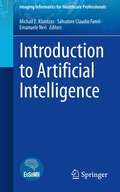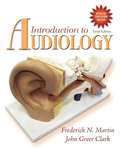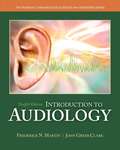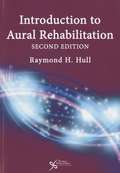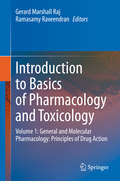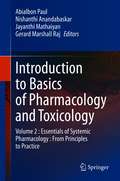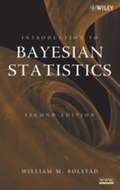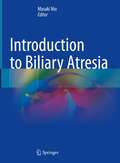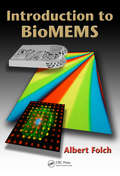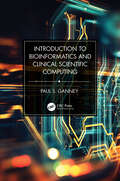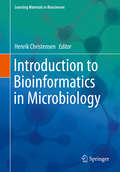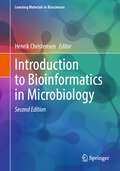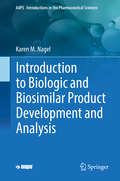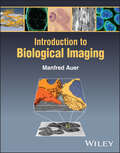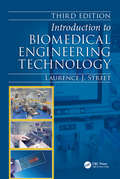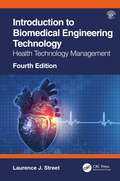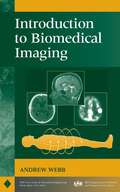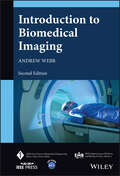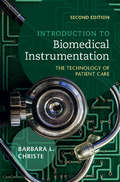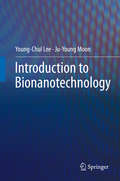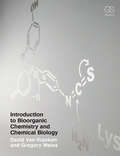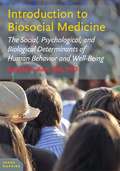- Table View
- List View
Introduction to Artificial Intelligence (Imaging Informatics for Healthcare Professionals)
by Emanuele Neri Michail E. Klontzas Salvatore Claudio FanniThis book aims to provide physicians and scientists with the basics of Artificial Intelligence (AI) with a special focus on medical imaging. The contents of the book provide an introduction to the main topics of artificial intelligence currently applied on medical image analysis. The book starts with a chapter explaining the basic terms used in artificial intelligence for novice readers and embarks on a series of chapters each one of which provides the basics on one AI-related topic. The second chapter presents the programming languages and available automated tools that enable the development of AI applications for medical imaging. The third chapter endeavours to analyse the main traditional machine learning techniques, explaining algorithms such as random forests, support vector machines as well as basic neural networks. The applications of those machines on the analysis of radiomics data is expanded in the fourth chapter to allow the understanding of algorithms used to build classifiers for the diagnosis of disease processes with the use of radiomics. Chapter five provides the basics of natural language processing which has revolutionized the analysis of complex radiological reports and chapter six affords a succinct introduction to convolutional neural networks which have revolutionized medical image analysis enabling automated image-based diagnosis, image enhancement (e.g. denoising), protocolling etc. The penultimate chapter provides an introduction to data preprocessing for use in the aforementioned artificial intelligence applications. The book concludes with a chapter demonstrating AI-based tools already in radiological practice while providing an insight about the foreseeable future. It will be a valuable resource for radiologists, computer scientists and postgraduate students working on medical image analysis.
Introduction to Audiology (10th edition)
by Frederick N. Martin John Greer ClarkThe ninth edition of Martin's (U. of Texas at Austin) and Clark's (U. of Cincinnati) textbook features updated material throughout the text, including more detailed discussions of recent objective measures; new material on licensing/certification, outcome measures, and evidence-based practice; a revised discussion of the rapidly evolving measures of auditory evoked potentials; and separate discussions of pediatric and adult hearing aid selection/verification and hearing loss management.
Introduction to Audiology 12th Edition
by Frederick N. Martin John Greer ClarkThis comprehensive, well-organized introduction to hearing and balance disorders gives students a number of vital tools to help them better understand, retain, and analyze the material. Introduction to Audiology, 12/e by Martin and Clark continues to update the material to keep content current with recent research, while retaining and improving a user-friendly approach to the topics and an abundance of how-to information which shows the rewarding, fascinating aspects of a career in audiology.
Introduction to Aural Rehabilitation (Second Edition)
by Raymond H. HullNow in its second edition, Introduction to Aural Rehabilitation continues to provide all the elements necessary for a comprehensive, practice-oriented course in the habilitation/rehabilitation of children, adults, and the elderly with impaired hearing. This user-friendly text focuses on the most important clinical and practical aspects of providing services to the hearing impaired, while avoiding the technical detail of theoretical texts. . This second edition offers more in-depth information on cochlear implantation-including surgical procedures as well as the benefits for children and adults-and is approached from an amplification standpoint across several chapters by new contributing authors. . New and expanded information for Introduction to Aural Rehabilitation, Second Edition, includes the following topics: Speech development for children with impaired hearing; Listening and language development for children with impaired hearing; Hearing aids and non-hearing aid assistive listening devices; Hearing aids for children with impaired hearing; Educational management of children with impaired hearing; Non-hearing assistive listening devices for adults; Physiology and psycho-social impact of hearing loss in older adulthood; Rehabilitation procedures for adults with impaired hearing; and Expanded appendixes on communication scales and questionnaires
Introduction to Basics of Pharmacology and Toxicology: Volume 1: General and Molecular Pharmacology: Principles of Drug Action
by Gerard Marshall Raj Ramasamy RaveendranThis book illustrates, in a comprehensive manner, the most crucial principles involved in pharmacology and allied sciences. The title begins by discussing the historical aspects of drug discovery, with up to date knowledge on Nobel Laureates in pharmacology and their significant discoveries. It then examines the general pharmacological principles - pharmacokinetics and pharmacodynamics, with in-depth information on drug transporters and interactions. In the remaining chapters, the book covers a definitive collection of topics containing essential information on the basic principles of pharmacology and how they are employed for the treatment of diseases.Readers will learn about special topics in pharmacology that are hard to find elsewhere, including issues related to environmental toxicology and the latest information on drug poisoning and treatment, analytical toxicology, toxicovigilance, and the use of molecular biology techniques in pharmacology. The book offers a valuable resource for researchers in the fields of pharmacology and toxicology, as well as students pursuing a degree in or with an interest in pharmacology.
Introduction to Basics of Pharmacology and Toxicology: Volume 2 : Essentials of Systemic Pharmacology : From Principles to Practice
by Gerard Marshall Raj Abialbon Paul Nishanthi Anandabaskar Jayanthi MathaiyanThis book explains the pharmacological relationships between the various systems in the human body. It offers a comprehensive overview of the pharmacology concerning the autonomic, central, and peripheral nervous systems. Presenting up-to-date information on chemical mediators and their significance, it highlights the therapeutic aspects of several diseases affecting the cardiovascular, renal, respiratory, gastrointestinal, endocrinal, and hematopoietic systems. The book also includes drug therapy for microbial and neoplastic diseases. It also comprises sections on immunopharmacology, dermatological, and ocular pharmacology providing valuable insights into these emerging and recent topics. Covering the diverse groups of drugs acting on different systems, the book reviews their actions, clinical uses, adverse effects, interactions, and subcellular mechanisms of action. It is divided into 11 parts, subdivided into several chapters that evaluate the basic pharmacological principles that govern the different types of body systems. This book is intended for academicians, researchers, and clinicians in industry and academic institutions in pharmaceutical, pharmacological sciences, pharmacy, medical sciences, physiology, neurosciences, biochemistry, molecular biology and other allied health sciences.
Introduction to Basics of Pharmacology and Toxicology: Volume 3 : Experimental Pharmacology : Research Methodology and Biostatistics
by Gerard Marshall Raj Mageshwaran Lakshmanan Deepak Gopal ShewadeThis volume is designed to impart the fundamental concepts in experimental pharmacology, research methodology and biostatistics. Through this book, the readers will learn about different methods involved in drug discovery, experimental animals and their care, equipments and the various bioassays used in experimental pharmacology. This book contains special sections on various drug screening methods involved in the evaluation of different body systems. Certain sections provide the healthcare professionals with the knowledge necessary to interpret clinical research articles, design clinical studies, and learn essential concepts in biostatistics in an expedient and concise manner. Basic principles and applications of simple analytical methods employed in drug analysis are well written under one section. It focuses on the basic and advanced laboratory techniques and also on computer simulated data, written extensively under the Biostatistics section. The methods used for drug analysis have been described in adequate detail with cross-references for further studies and comprehension. Overall, the book is designed systematically with four broad sections with extensive subdivisions for easy tracking, interpretation, and understanding.
Introduction to Bayesian Methods in Ecology and Natural Resources
by William E. Strawderman Edwin J. Green Andrew O. FinleyThis book presents modern Bayesian analysis in a format that is accessible to researchers in the fields of ecology, wildlife biology, and natural resource management. Bayesian analysis has undergone a remarkable transformation since the early 1990s. Widespread adoption of Markov chain Monte Carlo techniques has made the Bayesian paradigm the viable alternative to classical statistical procedures for scientific inference. The Bayesian approach has a number of desirable qualities, three chief ones being: i) the mathematical procedure is always the same, allowing the analyst to concentrate on the scientific aspects of the problem; ii) historical information is readily used, when appropriate; and iii) hierarchical models are readily accommodated.This monograph contains numerous worked examples and the requisite computer programs. The latter are easily modified to meet new situations. A primer on probability distributions is also included because these form the basis of Bayesian inference.Researchers and graduate students in Ecology and Natural Resource Management will find this book a valuable reference.
Introduction to Bayesian Statistics
by William M. BolstadThe use of Bayesian methods in applied statistical analysis has become increasingly popular, yet most introductory statistics texts continue to only present the subject using frequentist methods. Introduction to Bayesian Statistics, Second Edition focuses on Bayesian methods that can be used for inference, and it also addresses how these methods compare favorably with frequentist alternatives. Teaching statistics from the Bayesian perspective allows for direct probability statements about parameters, and this approach is now more relevant than ever due to computer programs that allow practitioners to work on problems that contain many parameters.This book uniquely covers the topics typically found in an introductory statistics book--but from a Bayesian perspective--giving readers an advantage as they enter fields where statistics is used. This Second Edition provides:Extended coverage of Poisson and Gamma distributionsTwo new chapters on Bayesian inference for Poisson observations and Bayesian inference for the standard deviation for normal observationsA twenty-five percent increase in exercises with selected answers at the end of the bookA calculus refresher appendix and a summary on the use of statistical tablesNew computer exercises that use R functions and Minitab® macros for Bayesian analysis and Monte Carlo simulationsIntroduction to Bayesian Statistics, Second Edition is an invaluable textbook for advanced undergraduate and graduate-level statistics courses as well as a practical reference for statisticians who require a working knowledge of Bayesian statistics.
Introduction to Biliary Atresia
by Masaki NioThis book offers a comprehensive overview of the latest standard medical procedures and surgical techniques for biliary atresia (BA), as well as the perioperative care, long-term follow-up and transitions. Experts on pediatrics in such fields as hepatology, surgery, pathology, and liver transplantation present their research findings and analyses of this rare and intractable disease of unknown etiology. In Japan, shared experience and sound understanding based on conferences and guidelines have led to standardization of management and clinical care and, as a result, better outcomes. Providing insights into improving surgical outcomes, and including special chapters focusing on social support systems for patients and families as well as recent advances in early diagnosis, this book a valuable resource for medical professionals around the globe who are involved in treating biliary atresia. It is especially useful for pediatric hepatologists, pediatric surgeons and transplant surgeons.
Introduction to BioMEMS
by Albert FolchThe entire scope of the BioMEMS field-at your fingertipsHelping to educate the new generation of engineers and biologists, Introduction to BioMEMS explains how certain problems in biology and medicine benefit from and often require the miniaturization of devices. The book covers the whole breadth of this dynamic field, including classical microfabr
Introduction to Bioinformatics and Clinical Scientific Computing
by Paul S. GanneyThis textbook provides an introduction to computer science theory, informatics best practice, and the standards and legislation that apply to computing in a healthcare environment. It delivers an accessible discussion of databases (construction, interrogation and maintenance); networking (design and low-level application); programming (best practice rather than the specifics of any one language – design, maintenance, safety). It can be used to accompany the NHS Modernising Scientific Careers syllabus. It is also targeted towards those creating software rather than those using it, particularly computer scientists working in healthcare, specifically those in or close to the Physical Sciences, including radiotherapy, nuclear medicine, and equipment management and those working with genomics and health informatics.
Introduction to Bioinformatics in Microbiology (Learning Materials in Biosciences)
by Henrik ChristensenThis textbook introduces to the basic concepts of bioinformatics and enhances students’ skills in using software and tools relevant for investigations in microbiology. The most relevant methods to analyze data are shown and readers are introduced on how to draw valid conclusions based on the results obtained. Software and servers which are free to use on the internet are presented and more advanced stand-alone programs are suggested as a second option. Exercises and training quizzes are provided at the end of each chapter to facilitate learning. The book targets Ph. D. students and advanced undergraduates in microbiology, biotechnology, and (veterinary) medicine with little to basic knowledge in bioinformatics.
Introduction to Bioinformatics in Microbiology (Learning Materials in Biosciences)
by Henrik ChristensenThis updated and extended second edition of the textbook introduces the basic concepts of bioinformatics and enhances students' skills in the use of software and tools relevant to microbiology research. It discusses the most relevant methods for analysing data and teaches readers how to draw valid conclusions from the observations obtained. Free software and servers available on the Internet are presented in an updated version of 2023 and more advanced stand-alone software is proposed as a second option. In addition, new tools for microbial genome analysis and new flowcharts that complement the didactic elements have been added. Exercises and training questionnaires are included at the end of each chapter to facilitate learning. The book is aimed at Ph.D. students and advanced undergraduate students in microbiology, biotechnology, and (veterinary) medicine with little or basic knowledge of bioinformatics.
Introduction to Biologic and Biosimilar Product Development and Analysis (AAPS Introductions in the Pharmaceutical Sciences)
by Karen M. NagelThe purpose of this book is to give a concise introduction to development and analysis of pharmaceutical biologics for those in the pharmaceutical industry who are switching focus from small molecules to biologics processing, analysis, and delivery. In order to maintain a limited focus, Introduction to Biologic and Biosimilar Product Development and Analysis, will deal only with peptides, proteins and monoclonal antibodies.
Introduction to Biological Imaging
by Manfred AuerIntroduction to Biological Imaging Discover what biological imaging is able to accomplish in this up-to-date textbook One of the fundamental goals of biology is to understand how living organisms establish and maintain their spatiotemporal organization of the biochemical, cell biological and developmental biology processes that sustain life. Biological systems are inherently complex with a large number of components needed to sustain cellular function. In order to understand any complex system, one must determine its composition by identifying the components it is made of, how each of these components function and carry out their specific task, and how they interact with one another to function together. To grasp the link of such changes to physiological cell and tissue function and/or pathogenesis/disease progression, we need to understand how modifications alter macromolecular function, macromolecular interactions, and/or spatiotemporal distribution and overall supramolecular structural organization. Biological imaging holds the key to understanding spatiotemporal organization, and will thus be increasingly important for the next generations of biological and biochemical researchers. Introduction to Biological Imaging provides the first comprehensive textbook surveying this subject. It elucidates the fundamental principles underlying the capture and production of bioimages, the requirements of image analysis and interpretation, and some key problems and solutions in bioimaging. It includes everything experimental biologists need to incorporate appropriate bioimaging solutions into their work. Introduction to Biological Imaging readers will also find: Coverage of all major types of biological imaging, including medical imaging, cellular imaging, macromolecular imaging, and more Advice on preparing samples for various imaging methods Specific examples in each chapter connecting bioimaging process to the production of real experimental data Introduction to Biological Imaging is a valuable introduction for undergraduate or graduate students in courses relating to bioimaging, as well as scientists and researchers in the biological and medical fields who want a one-stop reference for the full range of imaging techniques.
Introduction to Biomaterials
by C. Mauli Agrawal Joo L. Ong Mark R. Appleford Gopinath Mani C. Mauli Agrawal Joo L. Ong Mark R. ApplefordThis succinct textbook gives students the perfect introduction to the world of biomaterials, linking the fundamental properties of metals, polymers, ceramics and natural biomaterials to the unique advantages and limitations surrounding their biomedical applications. Clinical concerns such as sterilization, surface modification, cell-biomaterial interactions, drug delivery systems, and tissue engineering are discussed in detail, giving students practical insight into the real-world challenges associated with biomaterials engineering; key definitions, equations and concepts are concisely summarised alongside the text, allowing students to quickly and easily identify the most important information; and bringing together elements from across the book, the final chapter discusses modern commercial implants, challenging students to consider future industrial possibilities. Concise enough to be taught in a single semester, and requiring only a basic understanding of biology, this balanced and accessible textbook is the ideal introduction to biomaterials for students of engineering, materials science and medicine. <P><P><i>Advisory: Bookshare has learned that this book offers only partial accessibility. We have kept it in the collection because it is useful for some of our members. Benetech is actively working on projects to improve accessibility issues such as these.</i>
Introduction to Biomedical Engineering Technology
by Laurence J. StreetThis new edition provides major revisions to a text that is suitable for the introduction to biomedical engineering technology course offered in a number of technical institutes and colleges in Canada and the US. Each chapter has been thoroughly updated with new photos and illustrations which depict the most modern equipment available in medical technology. This third edition includes new problem sets and examples, detailed block diagrams and schematics and new chapters on device technologies and information technology.
Introduction to Biomedical Engineering Technology, 4th Edition: Health Technology Management
by Laurence J. StreetThis updated fourth edition provides current information on devices and is divided into diagnostic and treatment sections. Devices are described with the theory of operation and relevant anatomical and physiological considerations. Aspects of BMET work including test equipment, standards, and information technology are also discussed. The text covers a wide variety of diagnostic and treatment devices currently used in hospitals that students will likely encounter in their career. Principles of operation and examples of use are provided. This book is unique in that it is written by an experienced biomed tech with 30 years’ experience in hospitals rather than by engineers with little frontline experience. It is also unique in that it provides ancillary materials on the web and is the only guide divided into diagnostic and treatment device sections. This new edition also includes two new chapters on computers, information technology, and networking as well as health technology management. From the previous edition: "The book presents a comfortable balance between clinical applications, basic technical information, and various pictures of medical technologies one will encounter in the field. Additionally, related anatomy and physiology principles and essential technical terms are a nice complement to the technologies presented. The everyday duties and responsibilities of a biomed are captured by the various ‘true-to-life’ scenarios introduced throughout the book." —Joey Jones, Madisonville Community College, Kentucky, USA This book is intended for students in biomedical engineering technology and healthcare technology management (BMET/HTM) programs as well as biomedical engineering students. Field service representatives, medical device designers, and medical device sales representatives will also find it useful.
Introduction to Biomedical Imaging
by Andrew G. WebbAn integrated, comprehensive survey of biomedical imaging modalities An important component of the recent expansion in bioengineering is the area of biomedical imaging. This book provides in-depth coverage of the field of biomedical imaging, with particular attention to an engineering viewpoint. Suitable as both a professional reference and as a text for a one-semester course for biomedical engineers or medical technology students, Introduction to Biomedical Imaging covers the fundamentals and applications of four primary medical imaging techniques: magnetic resonance imaging, ultrasound, nuclear medicine, and X-ray/computed tomography. Taking an accessible approach that includes any necessary mathematics and transform methods, this book provides rigorous discussions of: The physical principles, instrumental design, data acquisition strategies, image reconstruction techniques, and clinical applications of each modality Recent developments such as multi-slice spiral computed tomography, harmonic and sub-harmonic ultrasonic imaging, multi-slice PET scanning, and functional magnetic resonance imaging General image characteristics such as spatial resolution and signal-to-noise, common to all of the imaging modalities
Introduction to Biomedical Imaging: Physics, Engineering And Clinical Applications (IEEE Press Series on Biomedical Engineering)
by Andrew WebbIntroduction to BiomedicalImaging A state-of-the-art exploration of the foundations and latest developments in biomedical imaging technology In the newly revised second edition of Introduction to Biomedical Imaging, distinguished researcher Dr. Andrew Webb delivers a comprehensive description of the fundamentals and applications of the most important current medical imaging techniques: X-ray and computed tomography, nuclear medicine, ultrasound, magnetic resonance imaging, and various optical-based methods. Each chapter explains the physical principles, instrument design, data acquisition, image reconstruction, and clinical applications of its respective modality. This latest edition incorporates descriptions of recent developments in photon counting CT, total body PET, superresolution-based ultrasound, phased-array MRI technology, optical coherence tomography, and iterative and model-based image reconstruction techniques. The final chapter discusses the increasing role of artificial intelligence/deep learning in biomedical imaging. The text also includes a thorough introduction to general image characteristics, including discussions of signal-to-noise and contrast-to-noise. Perfect for graduate and senior undergraduate students of biomedical engineering, Introduction to Biomedical Imaging, 2nd Edition will also earn a place in the libraries of medical imaging professionals with an interest in medical imaging techniques.
Introduction to Biomedical Instrumentation
by Barbara ChristeThis fully updated second edition provides readers with all they need to understand the use of medical technology in patient care. Incorporating the most recent changes in healthcare, regulations, Standards, and technology, coverage is expanded to include new chapters on device testing, with a particular emphasis on safety inspections, and the interface of medical technology with the electronic medical record. A wide variety of medical instrumentation is discussed, focusing on device types and classifications, and including individual manufacturers as examples. It is designed for readers with a fundamental understanding of anatomy, physiology and medical terminology, as well as electronic concepts such as voltage, current, resistance, impedance, analog and digital signals, and sensors. Additional documents and solutions to end-of-chapter questions accompany the book online, providing biomedical engineering technicians with the resources and tools they need to become knowledgeable and effective members of the patient care team.
Introduction to Bionanotechnology
by Young-Chul Lee Ju-Young MoonThis is a comprehensive overview of bionanotechnology to students in nanotechnology, biotechnology, bionanotechnology, related fields such as biology, chemistry, physics, and materials science and also everyone who is interested in this research area. It describes the definition of bionanomaterials, how they can be synthesized, characterized and applied in different fields. The current status and future of bionanotechnology, as well as its advantages and limitations, are comprehensively discussed throughout the book. This is an entry-level book which is easy for readers to understand its contents. In this book, we tried to identify the definition of bionanotechnology. Briefly, Bionanotechnology is the emerging research field that comes from the intersection of nanotechnology and biotechnology. Nanotechnology is referring to the design, development, and application of materials which at least one dimension at nanometer scale meanwhile biotechnology is developed based on knowledge about living systems and organisms to create or improve different products. The association of nanotechnology and biotechnology pave a way to develop a hybrid technology with unique features. Thus, this novel technology will be used to improve our living standard in different aspects from developing new medicine, food, and functional cosmetics, introducing new methods to analyze and treat cancer to protect environmental problems.
Introduction to Bioorganic Chemistry and Chemical Biology
by David Van Vranken Gregory A. WeissIntroduction to Bioorganic Chemistry and Chemical Biology is the first textbook to blend modern tools of organic chemistry with concepts of biology, physiology, and medicine. With a focus on human cell biology and a problems-driven approach, the text explains the combinatorial architecture of biooligomers (genes, DNA, RNA, proteins, glycans, lipids, and terpenes) as the molecular engine for life. Accentuated by rich illustrations andmechanistic arrow pushing, organic chemistry is used to illuminate the central dogma of molecular biology.Introduction to Bioorganic Chemistry and Chemical Biology is appropriate for advanced undergraduate and graduate students in chemistry and molecular biology, as well as those going into medicine and pharmaceutical science.Please note that Garland Science flashcards are no longer available for this text. However, the solutions can be obtained through our Support Material Hub link below, but should only be requested by instructors who have adopted the book on their course.
Introduction to Biosocial Medicine: The Social, Psychological, and Biological Determinants of Human Behavior and Well-Being
by Donald A. Barr<p>While 40 percent of premature deaths in the United States can be attributed to such dangerous behaviors as smoking, overeating, inactivity, and drug or alcohol use, medical education has generally failed to address how these behaviors are influenced by social forces. This new textbook from Dr. Donald A. Barr was designed in response to the growing recognition that physicians need to understand the biosocial sciences behind human behavior in order to be effective practitioners. Introduction to Biosocial Medicine explains the determinants of human behavior and the overwhelming impact of behavior on health. <p>Drawing on both recent and historical research, the book combines the study of the biology of humans with the social and psychological aspects of human behavior. Dr. Barr, a sociologist as well as physician, illustrates how the biology of neurons, the intricacies of the human mind, and the power of broad social forces all influence individual perceptions and responses. Addressing the enormous potential of interventions from medical and public health professionals to alter these patterns of human behavior over time, Introduction to Biosocial Medicine brings necessary depth and perspective to medical training and education.</p>
